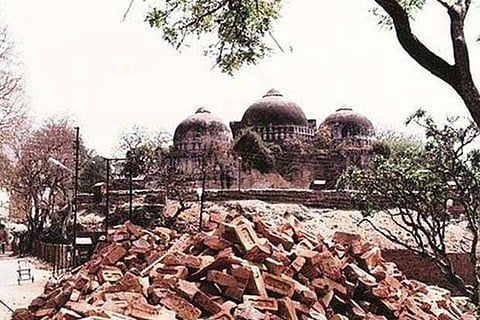

New Delhi
The Muslim parties on Tuesday expressed their willingness to concede 'Shebait' rights from 1858 to the Nirmohi Akhara which has claimed that its rights have not been challenged by any party, on the 18th day of hearing in the Ayodhya title dispute in the Supreme Court.
Senior advocate Rajeev Dhavan, representing the Muslim parties, submitted before the Supreme Court that there no contestation to 'Shebait', which he described as a manager, from 1858.
A Constitution bench comprising of five judges and headed by Chief Justice Ranjan Gogoi is hearing the Ayodhya title dispute.
Dhavan contended before the bench to imagine a scenario where a magnificent Ram temple is built, "What would happen to Shebait after the construction of this temple?"
He also argued that how did the Nirmohi Akhara get the outer courtyard because it was given to them.
The inner courtyard, which has been claimed by the Hindu parties as the birthplace of Lord Ram is land-locked in the outer courtyard.
According to the source in Nirmohi Akhara, "The Muslim parties only conceded the rights of the Shebait in the outer courtyard. They are probably trying to target the suit number 5 filed Devki Nandan Aggarwal who claims to be the next friend of the deity, therefore avails the legal right to represent the deity. Akhara's Shebait right has not been challenged by anybody."
Though, Dhavan initially argued against claims of Nirmohi Akhara stating that the relief sought comes from their edginess to get the management rights. He told the court that the Akhara wanted attachment order to go so that they could manage the property again, and they are not concerned about anything else.
Dhavan told the bench the idols were moved from the Ram Chabutra, outer courtyard, located at eastern outer wall of the disputed structure on the intervening night of December 22 and morning of December 23, 1949.
Justice S.A. Bobde, one of the judges on the bench, queried Dhavan, "Has any witness said that the same idol which was outside was installed inside, in the inner courtyard where did it come from?"
Dhavan replied that he finds a kind of break in logic, as people as a matter of belief go there and offer prayers.
Justice D.Y. Chandrachud, judge on the bench, queried Dhavan: "Even if we were to not accept Janmasthana (the birthplace) is not a juridical person (subject to law), won't the right of the deity as a juridical person extend to the entire area in dispute? How can you keep out Sita Rasoi and Ram Chabutara out, you worship all of that."
Dhavan contested this argument of the Hindu parties referring the Janambhoomi as the birthplace of Lord Ram. He contended before the court that "they (Hindus) claim we want that spot, how can this be the exact spot?"
"There was a massive temple, and this is the spot?" he told the court stating that these claims were exaggerated.
Initially, during the hearing Dhavan cited the report of the Waqf inspector, a person authorised to monitor the area, but the court queried if the veracity of the contents of the report been validated.
He said according to the report 'namaz' was offered in the inner courtyard. He told the court under the middle dome in the inner north arch calligraphically 'Allah' has been inscribed on the wall. He also affirmed the presence of 'wazu' inside the disputed structure.
Dhavan claimed before the court that there is not a single evidence to show exclusive ownership of Hindus over the disputed property, and "Parikarma" establishes worship but it cannot mean entitlement of the disputed structure.
"Entitlement to what?" quipped Justice Bobde to Dhavan.
He replied that the entitlement to the entire piece of land, and if the court accepts their arguments on "Swayambhu" or self-existing, then the entire property would go to them, and then Muslims get nothing. "Muslims are claiming their right on the property," said Dhavan.
He also informed the court that Muslims could not offer 'namaz' at the disputed property because they were not allowed to offer 'namaz'. "We lost possession and that led to adverse possession," contended Dhavan.
He also cited collusion between local officials in 1950 after the trespass on the disputed structure, and who remain biased towards the Hindu parties.
Visit news.dtnext.in to explore our interactive epaper!
Download the DT Next app for more exciting features!
Click here for iOS
Click here for Android